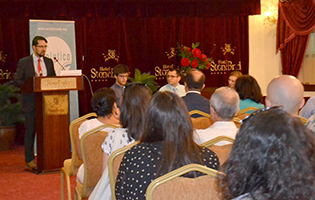
A majority of citizens believe that the police works for the interests of particular groups
The majority of the citizens from the countries of the Western Balkan believe that the police most of the time operates as a means to protect the government, political parties and the highest ranks of the police interest. At the same time, the police is one of the institutions with the highest trust rate among the citizens of Kosovo, Albania, Macedonia, Montenegro, Bosnia and Herzegovina and Serbia. These are two of the main findings from the research that Analytica Think Tank presented on the 1st of September at the Stone Bridge hotel in Skopje. The public opinion polls were conducted as a part of the project activities of the POINTPULSE network of NGOs.
In Macedonia, citizens older than 60 are the group that is the most convinced that the police works for citizens’ interests. People aged 30-44 tend to believe that the police operates to protect the government’s interests. And the youngest audience in these polls, ages 18-29, believe that the police operates as a tool to protect the interests of the political parties.
The surveys reveal that almost every other citizen of the Balkan region thinks that the police is corrupt, although the respondents mention the police as the institution they trust second-most. This finding is a bit of problematic because the respondents don’t see corruption as a negative phenomenon.
Filip Stojkovski, a researcher at Analytica, stated that 41.2% of the respondents in Macedonia think that political connections are vital to get a job in the police force, 20.6% declared that pulling strings with relatives or friends is another method to become a police officer , only 12.3% believe that you can be a police employee if you go through a public competition for employment, 4.3% stated that one can do so by bribing someone, and the rest declared that other means will get someone a job in the police.
All of the respondents from the Western Balkans agree that the traffic police, the border police, and the Minister of Interior’s closest associates are the most corrupt sectors in the police.
Martin Manaskov, a researcher at Analytica, stated that the respondents look at the police special units and the police administration as the least corrupted sectors in the police, especially alluding to the special units. According to the respondents, the special units are the least corrupted because employees in those sectors are required to attend high specialization trainings, and also friend relations don’t help them to acquire employment there.
Respondents from the Western Balkan countries are very divided when it comes to reporting acts of corruption. Almost half of the respondents (47%) would report corruption cases, and the other half (46%) would not report a case of corruption. Only 7% of the respondents refused to answer the question whether or not they would report corruption.
It is inspiring that compared to other countries in the survey, the citizens of Macedonia were the most willing to report a corruption case. Two thirds of the citizens answered positive when they were asked whether they report corruption if they are asked for personal data. The survey shows that citizens are very pessimistic about reporting corruption anonymously.
The research about citizens’ trust in the police was conducted in the following countries: Macedonia, Serbia, Kosovo, Albania, Montenegro and Bosnia & Herzegovina. The survey was conducted in April 2016 By IPSOS Adria using a sample of 1000 respondents (in the case of Macedonia).

